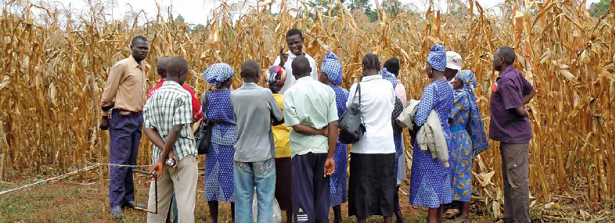Working Papers Agricultural Innovation Systems

The Royal Tropical Institute has published a series of Working Papers which are a result of the seminar “Agricultural Innovation Systems: reality check”. Over the past several decades, myriad initiatives have experimented with Agricultural Innovation Systems (AIS). These have been proposed as an answer to overcome the complex and wicked challenges faced by smallholders in developing countries. Time to reflect on what has been achieved: What is it that AIS offers and how do we think it contributes to impact?
The seminar brought together key thinkers to discuss cutting edge issues related to the development impact of Agricultural Innovation Systems (AIS) approaches. The event was organized by the Royal Tropical Institute (KIT), ICRA, and Wageningen UR’s Centre for Development Innovation (CDI), with support from GIZ and the Dutch Food & Business Knowledge Platform. The event took place at KIT in Amsterdam from September 13 till 15, 2016. During the seminar, participants dug into critical issues surrounding AIS, aiming to trigger new thinking, as well as collaboration between participants, to influence agricultural research and development policy and practice.
The seminar resulted in five Working Papers:
Do theories of change enable agricultural innovation systems to navigate? A reality check and comparison from practice.
Theories of change (ToCs) are increasingly used to articulate pathways for interventions and to support learning. This responds to the recognition of the complexity of agricultural development. Through two examples, this paper examines how ToCs have enabled practitioners to navigate towards impact in settings characterized by a multiplicity of views from different actors on issues of joint concern.
Download the Working Paper (PDF).
Agricultural Research for Development to Intervene Effectively in Complex Systems and the implications for research organisations.
Agricultural research for development (AR4D) organizations can achieve greater impact by using complexity-aware approaches, but for this to happen a more compelling case needs to be made to justify their use. Our contribution is to develop and test a generalizable complexity-aware theory of change of how AR4D fosters innovation.
Download the Working Paper (PDF).
Systems Analysis in AIS: potentials and pitfalls.
Agricultural innovation systems are complex, multi-layered, and can be difficult to define and analyse. In this paper, we provide examples of ‘systems analysis’: describing the context, what was done, and how the outcomes informed broader research and development activities. The five cases describe analyses of: i) agricultural systems in North-West Vietnam; ii) household food security in Central Vietnam; iii) agricultural innovation systems in Central Africa; iv) wheat commodity systems in Sub-Saharan Africa, and v) the national agricultural research system in Papua New Guinea.
Download the Working Paper (PDF).
The contribution of AIS approaches to achieving impact at scale: intentions, realities and outlooks.
Agricultural innovation systems (AIS) approaches contribute to achieving impact at scale: this is still a statement which is questioned and not yet a widely accepted fact. Any claims supporting it are based on circumstantial evidence at best. This chapter discusses why this is the case, examining how AIS approaches primarily create a relevant context perspective in support of learning and partnership processes, rather than leading to targeted strategies for achieving impact at scale.
Download the Working Paper (PDF).
Diversity, inclusion and Gender Dynamics in Agricultural Innovation Systems.
To be published soon





